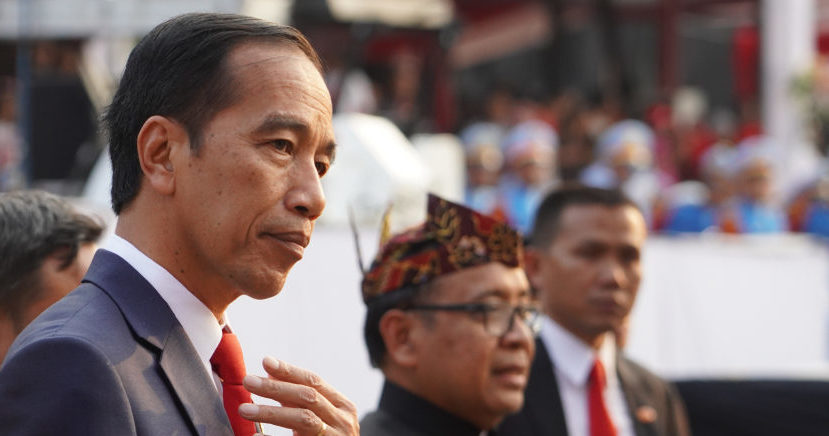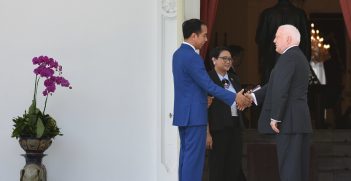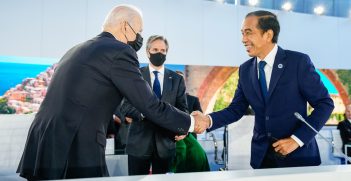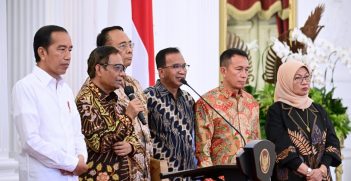Only the Right is Left in Indonesia’s Elections

Growing closer to the 2024 Indonesian presidential election, prospects of left-leaning political parties continue to diminish. It is likely that the country’s pressing social inequality issues will continue to be ignored and exacerbated.
From time to time, the question has been put to me about how a “centre-left” in Indonesia might fare against the “centre-right” or “right” for power and influence within the country’s often lauded, but also flawed, democracy. While labels like “left” and “right” can be problematic when not contextualised, there is a more essential problem at hand: there is actually no viable and coherently organised centre-left – much less outright left – forces in Indonesia today. In fact, there are only variations of centre-right- and right-wing forces that have been able to compete for power and significant influence in any electoral competition in Indonesia since the advent of reformasi in 1998. These tend to deploy political discourses that are either heavy on nationalism or religion or some combination of both, depending on calculations of expedience and convenience.
Such an observation is relevant to understand some of the dynamics of the Indonesian presidential and legislative elections scheduled to take place early next year. If we accept the generalisation that issues having to do with social equality and justice have tended to be the purview of those having leftist political inclinations, then no major political party can be expected to carry the banner of anything resembling a political left.
The vacuum on the left side of Indonesian politics is doubly important given issues of social equality and justice are being ignored at precisely the time they have become increasingly important. It is clear, for example, that democratisation has failed to address the gnawing gap between rich and poor in Indonesia, which has been a problem since at least the heyday of the authoritarian New Order regime (1966-1998). In 2017, it was pointed out that four of the richest men in Indonesia owned wealth that was equal to the poorest 100 million of their compatriots. While Indonesia’s Gini Ratio has hovered around the 0.4 mark for some time – despite experiencing a pre-Covid-19 reduction – this does not capture how around half of the wealth is controlled by just one percent of the population.
It is notable that incumbent president Jokowi (Joko Widodo) was hailed as “a man of the people” when he first came to national prominence, initially as governor of Jakarta in 2012 and then as a successful presidential candidate in 2014. This had brought some to muse, albeit temporarily, about whether Indonesia could develop a welfare state-like system under Jokowi. But despite some social welfare and public health schemes for which he can be credited during his first term, such thoughts have now been long extinguished.
Instead, there is much talk among Indonesia’s intelligentsia about how the country’s democracy has been captured by an oligarchy. Some analysts have conceived this oligarchy as being constituted by a fusion of politico-bureaucratic and big business interests that became structurally embedded within the Indonesian political economy during the New Order. Incubated by authoritarianism, the oligarchy subsequently colonised the institutions of Indonesian democracy, especially its political parties and parliaments. This view goes some way to explain why the Jokowi presidency has been ultimately so intertwined with the forces of oligarchy even if he was the first president since reformasi not to have had New Order-era credentials.
Jokowi’s non-oligarchic background also led some individuals with personal social democratic or liberal reformist pedigrees to champion him. Over his two presidential terms many such individuals have become incorporated into the government in roles of varying importance. But such legislation as the 2022 Omnibus Law, which infringes on labour rights and potentially contributes to further environmental degradation, clearly demonstrates that they lack much clout when confronting oligarchic interests. The same goes for developments which have severely weakened the Anti-Corruption Commission (KPK), formerly celebrated as a symbol of the triumph of reformasi, as well as laws designed to shield those in power from criticism, including in cyberspace – once imagined as a haven of free of expression.
Again, context is important. Indonesian history – as it intersected with that of the Cold War in Southeast Asia – was characterised by mass killings of leftists as part of the destruction of the Indonesian Communist Party in 1965/66. While some observers celebrated what they saw as the resurgence of leftist tendencies among a new generation of student activists in the 1990s, there have been no longer-term consequences in terms of resurrecting critiques of predatory capitalism, for example, in the mobilisation of public sentiment and as a factor in electoral politics. Many activists of that generation later joined a number of major political parties, but none can be said to represent workers, the peasantry, the urban precariat and the most downtrodden in Indonesian society.
So, what is the major ramification of the absence of a centre-left, much less an unambiguous left, in contemporary Indonesian politics? Does it mean that issues having to do with the vast gap between rich and poor, the low quality of public services, of growing precarity, including among Indonesia’s youthful population, or environmental degradation, are destined to be ignored?
Not necessarily. The question is how these issues get framed in the public debate. Because of the vacuum on the left side of the political spectrum, the tendency has been to present them in ways that resonate with nationalist and/or religious sentiments that have been cultivated anyway in everyday life through the national education system, as well as the products of the mainstream, and increasingly, social media – plus through armies of paid buzzers and influencers that work overtime when elections loom.
Due to the constant dissemination of messages that ostensibly uphold patriotic as well as moral values, much of the populace is quite receptive to the framing of social issues which places blame on “others”: sometimes foreign powers or economic interests but also those minorities that get cast aside whether on the basis of their ethnicity, religion, or even sexual orientation. Of course, this shifts attention from the mechanics of oligarchic domination.
No wonder anti-ethnic Chinese sentiment remains rife and wealthy Chinese businesspeople continue to protect themselves through alliances with politicians, bureaucrats, and generals. This provides fertile ground for varieties of centre-right and out-and-out right-wing political vehicles who have grown clever in combining, opportunistically, the jargons and symbols of hyper-nationalist and often hard-line religious populisms.
They are also, not incidentally, adept at political horse trading – as shown in the fluidity of political party coalitions presently supporting individual presidential candidates. The composition of these coalitions shifts more often due to the vicissitudes of polling results than because of disputes over policy or programs.
From this point of view, in spite of the predictably pro-people rhetoric of these coalitions, it is not surprising that none are particularly interested in, or ever pressured into, dealing with the myriad problems stemming from Indonesia’s structurally entrenched social injustices.
Vedi Hadiz is Professor of Asian Studies and Director of the Asia Institute, University of Melbourne. He is also an Assistant Deputy Vice-Chancellor International in the same University. Among his books are Reorganising Power in Indonesia: The Politics of Oligarchy in Age of Markets (2004, with Richard Robison) and Islamic Populism in Indonesia and the Middle East (2016).
This article is published under a Creative Commons License and may be republished with attribution.





